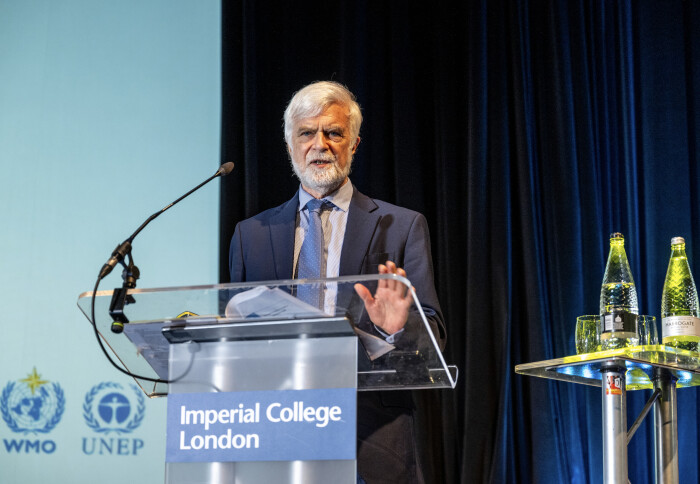IPCC Chair Jim Skea on the need for science on a carbon-constrained world

The Chair of the Intergovernmental Panel on Climate Change (IPCC), Professor Jim Skea, delivers the Dean’s Annual Lecture on the new climate era.
The newly elected Chair of the IPCC, Professor Jim Skea, set the stage for Imperial College London’s Sustainability Fortnight with a lecture on the urgent need for scientific leadership in addressing climate change.
Professor Skea is an Emeritus Professor and Chair of Sustainable Energy at the Centre for Environmental Policy.
Throughout his career, Professor Skea has shaped energy and climate change policy. His expertise has been recognised through various honours, including a CBE and an OBE for his contributions to sustainable energy and transport, respectively.
Drawing from the latest insights of the IPCC’s Sixth Assessment Report, Professor Skea outlined the magnitude of the risks posed by climate change, discussed the capacity of governments and other stakeholders to enact meaningful change, and explored how climate action intersects with broader societal goals.
Lessons from the sixth cycle
A big advance in the last IPCC report was the strength of the message that it was human activities that were causing climate change. Professor Jim Skea Chair of the IPCC and Emeritus Professor at the Centre for Environmental Policy
Professor Skea discussed the findings from the IPCC’s Sixth Assessment Report, which outlined society’s emission pathways into the future and their resulting climate scenarios.
They currently range from a low-warming scenario limiting warming to 1.5°C within this century, to a high scenario potentially resulting in up to 4°C of warming by 2100.
Despite the progress that has been made to cut emissions, high and very high scenarios are deemed still possible, though less probable now.
The report also showed significant risks, including irreversible ones, that are already playing out. “[We see that for] wildfire damage, permafrost degradation, and especially biodiversity loss, we are already beginning to see these impacts of current levels of warming,” Professor Skea said.

However, the Sixth Assessment Report also marked a significant step forward when addressing the reality of man-made climate change.
“A big advance in the last IPCC report was the strength of the message that it was human activities that were causing climate change,” Professor Skea said, referencing the use of the word ‘unequivocal’ to describe the level of evidence for anthropogenic climate change.
The growing international consensus around climate change may give momentum to positive trends that the report outlined, including the rapid fall in several renewable energy technologies such as onshore wind and solar panels.
An adaptation focus for the IPCC
There are lots of gaps at the moment between the action that we are taking and the action we would need to take to put us on track... Professor Jim Skea Chair of the IPCC and Emeritus Professor at the Centre for Environmental Policy
“There are lots of gaps at the moment between the action that we are taking and the action we would need to take to put us on track to meeting our long-term temperature goal,” Professor Skea said.
There are many scientific challenges still left in quantifying and predicting the effect of strategies in a world where we overshoot the 1.5°C warming target.
Carbon storage and removal technologies, for example, still need to be studied in greater detail so that scientists can predict their efficacy in reducing warming.
However, the primary focus of the Seventh Assessment Report will likely be different from previous cycles. “I know there’s a lot of interest in mitigation in Europe. This is promising to be a very adaptation-heavy cycle for the IPCC,” Professor Skea said.
Climate adaptation are policies and technologies that help societies become more resilient to the consequences of climate change, such as investing in weather alert systems or installing solar-powered irrigation.

He said: “We are not well-adapted to the climate in which awe are currently living in, therefore it is important that adaptation measures are taken alongside mitigation measures.”
The challenges in globally adopting adaptation measures may be even steeper than mitigation. The gap in funding for adaptation between the developed and developing world is greater than it is for mitigation. Professor Skea analysed that adaptation typically has a “public good characteristic” making it difficult to pull in private sector finance.
The IPCC’s input in the coming decade will be instrumental to closing existing equity gaps, and ensuring the world meets the targets outlined in the Paris Agreement.
“Believe me, the IPCC is not easy, but it’s worth it because it’s hugely influential and I’m grateful for the opportunity,” he said.
Professor Skea’s insights underscore the need for urgent climate action. The talk coincided the start of Imperial’s Sustainability Fortnight (19 February – 1 March), two weeks of sustainability-themed events including panel discussions with researchers and networking opportunities with sustainable energy employers.
The talk was closed by Professor Richard Craster, Dean of the Faculty of Natural Sciences.
Article text (excluding photos or graphics) © Imperial College London.
Photos and graphics subject to third party copyright used with permission or © Imperial College London.
Reporter
Jacklin Kwan
Faculty of Natural Sciences
Kate Grimwood
Centre for Environmental Policy